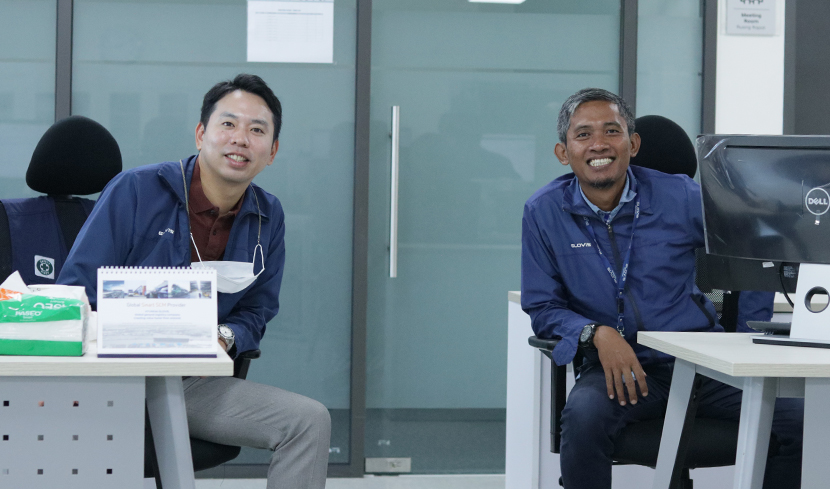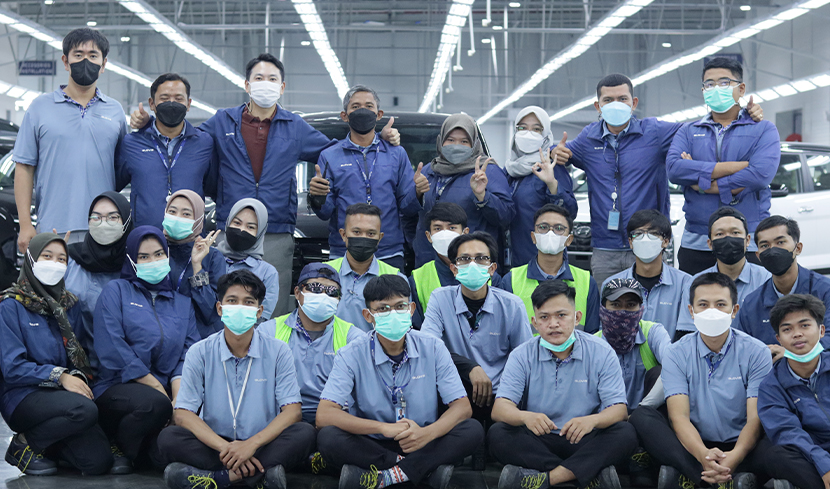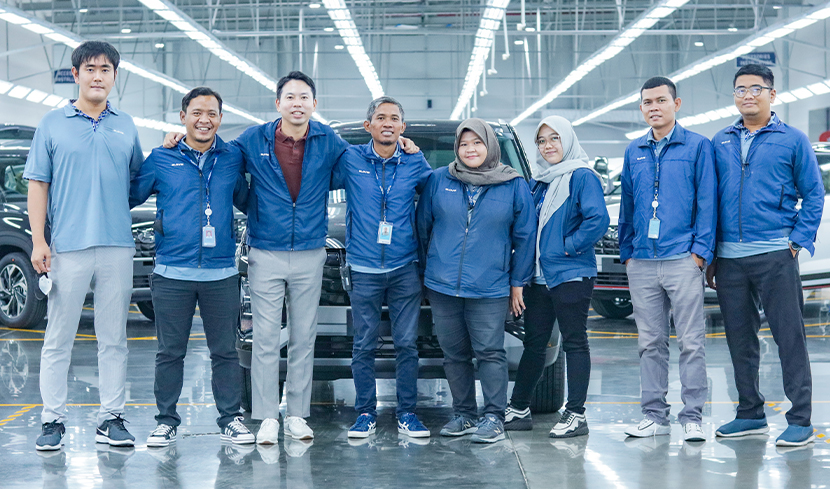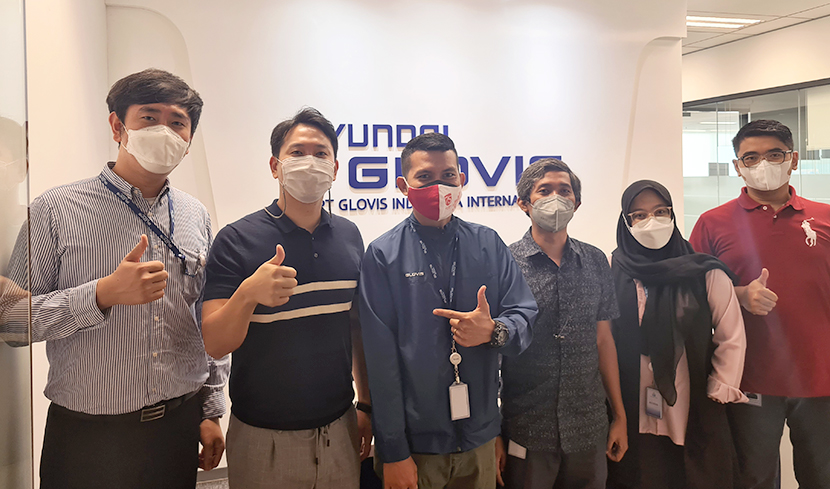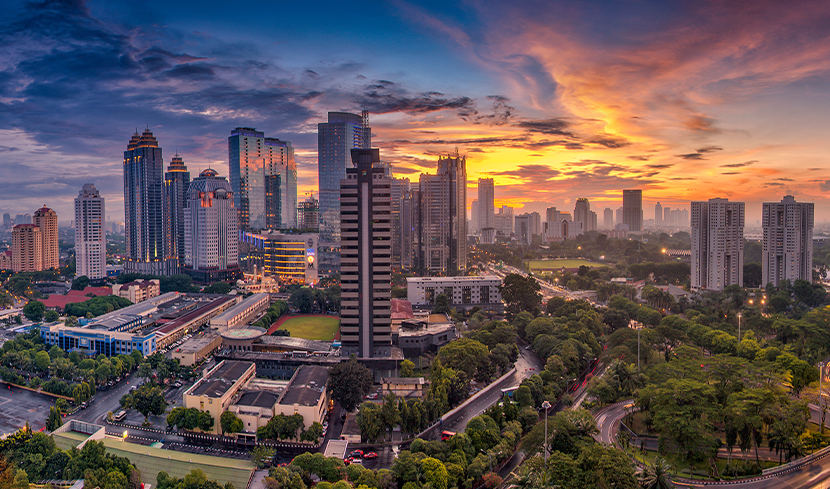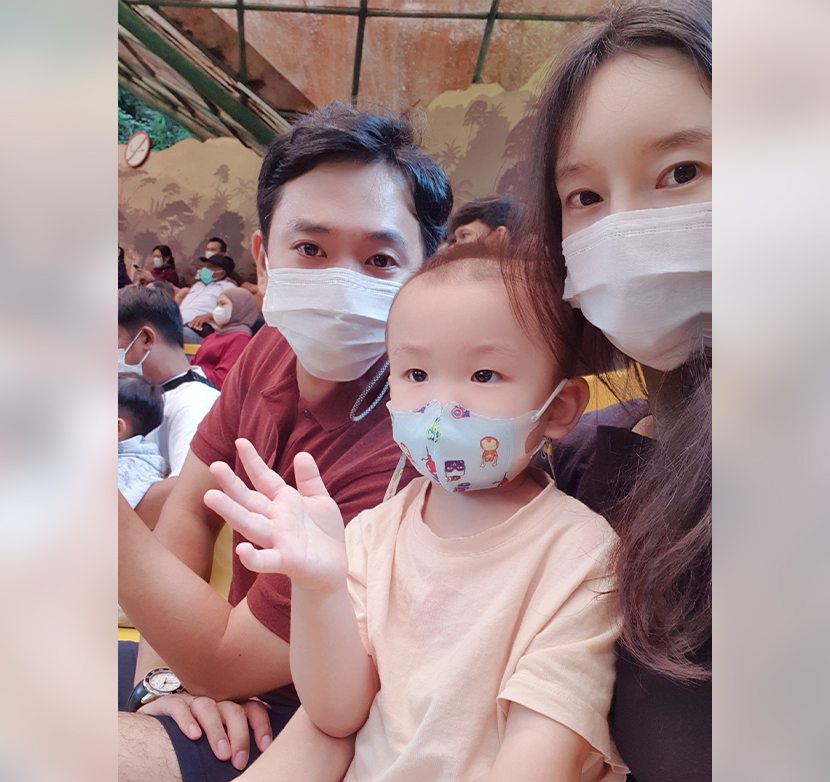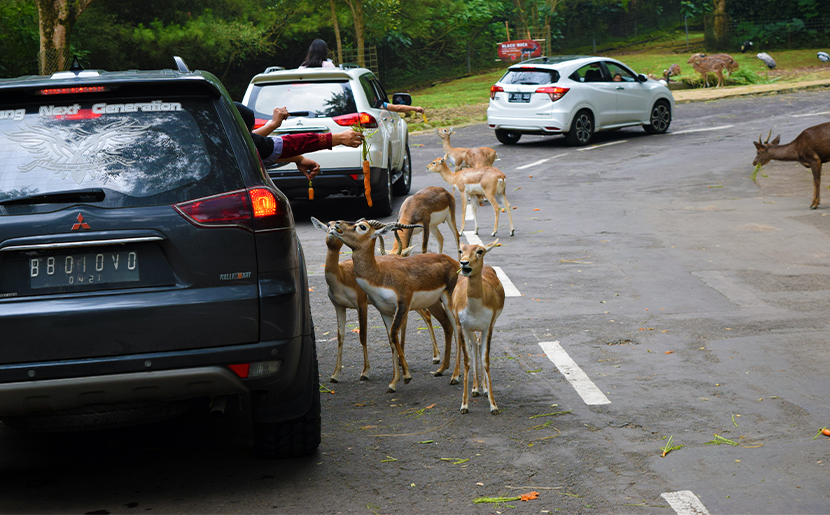Hyundai Glovis is actively targeting the global logistics market by expanding its overseas activities. One of these activities is the establishment of the company’s Indonesian branch, which engages in forwarding, procurement, and production distribution to support Hyundai Motor Company’s market share expansion. Hyundai Glovis’ Indonesian corporate office, established in 2021, is gaining much attention as one of the company’s ASEAN distribution bases, along with the company’s Vietnamese and Thai offices. Let’s take a look at the work and life of one of the employees who is at the center of this innovative workplace.

Q. Please introduce yourself.
Hello, I’m Jung Young-hoon and I’m a senior manager in charge of VPC at Glovis Indonesia International (GII). I joined the company in 2011 and have worked as an onsite employee in Indonesia for about a year and seven months now.
Jung Young-hoon, a senior manager in charge of VPC at Glovis Indonesia International (left)
Q. Please tell us about the Indonesian office.
The Indonesian office develops various businesses that support Hyundai Motors’ production and sales. Hyundai Motors launched the SU2id (Creta) in December 2021, followed by the TM (Santa Fe) and NE (Ionic 5). GII provides the forwarding, procurement, and production distribution services that are needed for the production of these vehicles. The produced vehicles pass through VPC and are then put on hold. After the vehicles are put on hold, they are loaded onto car carriers and sent to Indonesian customers. We also transport vehicles to the port for export. The exported vehicles are loaded onto the Glovis PCC to be shipped to several countries in the Middle East and Southeast Asia.
Q. What are your responsibilities at the Indonesian office?
I am in charge of exports and domestic shipments from the Indonesian Hyundai Motors factory. My main duties are separated into yard operations for CBUs (Hyundai vehicles imported by Korea) and completed cars produced by HMMI (Hyundai Motor Manufacturing Indonesia), PDI, and PIO.
Q. What is your daily schedule like?
I get to work at 7:30 AM and start the office meeting at 8 AM so that our team members can share, discuss, and report on things from the previous and upcoming days. From 8:30 to 10 AM, I inspect the PIO & PDI and HMMI & HMID yard sites. After coming back to the office, I check the daily export reports and the statistics on expected domestic shipments and PIO, and I look for any potential operational issues. In addition, I write a daily meeting and status report and share them with the Hyundai Motors production and sales corporations.
At around 5 PM, I check our daily production rates and goals and make plans for any needed overtime. The shift continues to run until the next morning. When there isn’t anything extra that I need to do, I get off of work at 7 PM and finish my day.
Q. What’s your biggest concern these days?
As Hyundai Motors is preparing for the launch of the KS (Stargazer) model, specifically targeting the Indonesian market, we have been working day and night to figure out the logistics for the launch. As of right now, Hyundai Motors holds less than 1% of the market share in Indonesia, where Japanese vehicles dominate the market, and is working hard to secure market shares. Hyundai Glovis Indonesia is leading the business in various logistics fields as part of its dynamic market response.
Q. Are there any notable differences between your work in Korea and overseas?
First of all, I’m very happy that I’ve gained so much understanding of our Indonesian work site. My role as a resident employee means that I have to manage many small things within the department. I can now relate to the difficulties managers experience, and it gives me the chance to grow further. I feel proud of our company when I see how Hyundai Glovis is taking care of necessary logistics for production and completing sales without any problems.
Q. Have you experienced any difficulties while working in Indonesia?
My Indonesian colleagues are friendly, follow directions well, and respect their elders and superiors, the last of which is similar to Korea. However, they are also reluctant to express their opinion, which makes it difficult at times when communicating with them.
Q. What did you do to try to quickly adapt to working abroad?
I learned the Indonesian language and tried to communicate with my Indonesian colleagues. I learned more than just simple greetings and learned how to communicate in everyday life so that I could talk to workers on site and in the office and understand their culture and thoughts a bit more.
Q. What are you the most proud of as an overseas staff member?
This is a new corporation, so I’ve been involved in everything. I helped with the building and layout on the empty site, furnished the site with necessary equipment and tools, and employed every staff member who works here, and I feel proud when I see our company operate without a hitch.
Q. What is your greatest plan or goal related to your work?
We just started a two-shift system and are mass producing a new main vehicle model, so we need a bit of time until we get things stabilized. We also plan to complete the tinted film installation and repair shop building in the first half of next year, which will add to my duties, so I’m preparing so that I can be fully ready to operate everything without a problem.
Q. Do you have anything you’d like say to your colleagues back in Korea?
I hope to stay healthy and finish up my resident employee life and return to see everyone looking well.
“I will help Hyundai Glovis expand its ASEAN business
through the steady growth of the Indonesian corporation.”

Q. What’s your neighborhood like?
I live south of downtown Jakarta. It’s a place with a lot of Korean residents that has a good infrastructure, including markets, hospitals, and supermarkets.
Q. Any places you like to frequent?
There is a restaurant called “Seribu Rasa,” which means “1,000 flavors” in Indonesian. It’s a delicious restaurant that serves local food. Whenever staff members come to visit from Korea, I take them to this restaurant. I enjoy the scenery and large scale of Indonesia top zoo “Taman Safari.” At the zoo, you can ride in your own car and enjoy the safari culture, instead of watching the animals from afar. Giving the animals food, like bananas and carrots, is something I’ve never experienced in Korea.
(Source: Shutterstock.com)
Taman Safari in Indonesia. Visitors can feed deer while in their cars.
Q. Have you experienced any culture shock?
About 81% of Indonesians are Muslim, and they pray five times a day. They start their day by praying at 4:30 AM. When I first started working, I had trouble adjusting to the sound of the praying and couldn’t sleep well, but now I don’t hear them, so I think I have adjusted well.
Q. Is there anything you’d like to do here before going back home?
Indonesia is made up of about 1,700 islands and 1,000 tribes. I won’t be able to visit and see all the islands and tribes, but I would like to visit top tourist spots like Bali and Lombok before going back to Korea.
“I will fulfill my responsibilities as a resident employee in the Indonesian office as I spend each day happily with my family.”
Writer Editorial Department
2022.08.23


